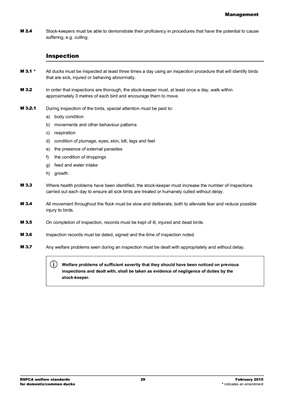
Management
RSPCA welfare standards
for domestic/common ducks
29 February 2015
* indicates an amendment
M 2.4 Stock-keepers must be able to demonstrate their proficiency in procedures that have the potential to cause
suffering, e.g. culling.
Inspection
M 3.1 * All ducks must be inspected at least three times a day using an inspection procedure that will identify birds
that are sick, injured or behaving abnormally.
M 3.2 In order that inspections are thorough, the stock-keeper must, at least once a day, walk within
approximately 3 metres of each bird and encourage them to move.
M 3.2.1 During inspection of the birds, special attention must be paid to:
a) body condition
b) movements and other behaviour patterns
c) respiration
d) condition of plumage, eyes, skin, bill, legs and feet
e) the presence of external parasites
f) the condition of droppings
g) feed and water intake
h) growth.
M 3.3 Where health problems have been identified, the stock-keeper must increase the number of inspections
carried out each day to ensure all sick birds are treated or humanely culled without delay.
M 3.4 All movement throughout the flock must be slow and deliberate, both to alleviate fear and reduce possible
injury to birds.
M 3.5 On completion of inspection, records must be kept of ill, injured and dead birds.
M 3.6 Inspection records must be dated, signed and the time of inspection noted.
M 3.7 Any welfare problems seen during an inspection must be dealt with appropriately and without delay.
Welfare problems of sufficient severity that they should have been noticed on previous
inspections and dealt with, shall be taken as evidence of negligence of duties by the
stock-keeper.